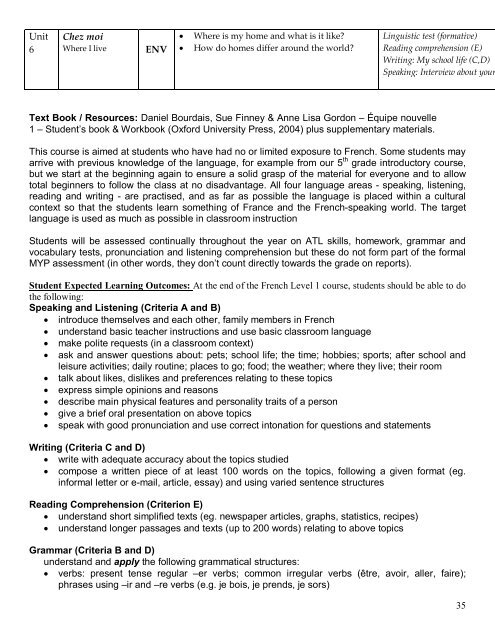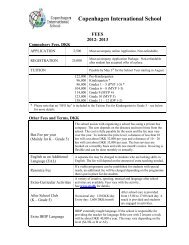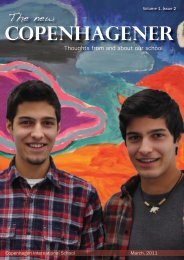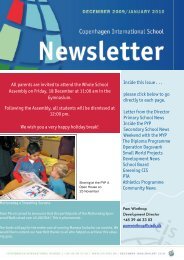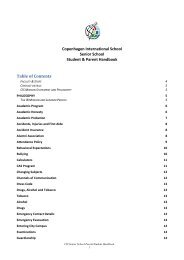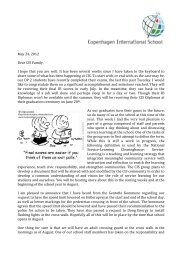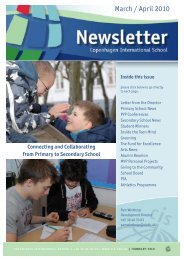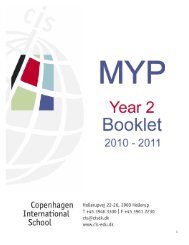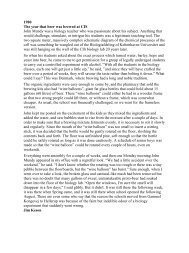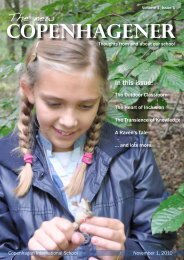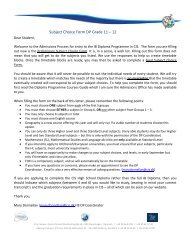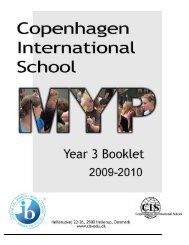German B - Copenhagen International School
German B - Copenhagen International School
German B - Copenhagen International School
You also want an ePaper? Increase the reach of your titles
YUMPU automatically turns print PDFs into web optimized ePapers that Google loves.
Unit<br />
6<br />
Chez moi<br />
Where I live<br />
ENV<br />
· Where is my home and what is it like<br />
· How do homes differ around the world<br />
Linguistic test (formative)<br />
Reading comprehension (E)<br />
Writing: My school life (C,D)<br />
Speaking: Interview about your<br />
Text Book / Resources: Daniel Bourdais, Sue Finney & Anne Lisa Gordon – Équipe nouvelle<br />
1 – Student’s book & Workbook (Oxford University Press, 2004) plus supplementary materials.<br />
This course is aimed at students who have had no or limited exposure to French. Some students may<br />
arrive with previous knowledge of the language, for example from our 5 th grade introductory course,<br />
but we start at the beginning again to ensure a solid grasp of the material for everyone and to allow<br />
total beginners to follow the class at no disadvantage. All four language areas speaking, listening,<br />
reading and writing are practised, and as far as possible the language is placed within a cultural<br />
context so that the students learn something of France and the Frenchspeaking world. The target<br />
language is used as much as possible in classroom instruction<br />
Students will be assessed continually throughout the year on ATL skills, homework, grammar and<br />
vocabulary tests, pronunciation and listening comprehension but these do not form part of the formal<br />
MYP assessment (in other words, they don’t count directly towards the grade on reports).<br />
Student Expected Learning Outcomes: At the end of the French Level 1 course, students should be able to do<br />
the following:<br />
Speaking and Listening (Criteria A and B)<br />
· introduce themselves and each other, family members in French<br />
· understand basic teacher instructions and use basic classroom language<br />
· make polite requests (in a classroom context)<br />
· ask and answer questions about: pets; school life; the time; hobbies; sports; after school and<br />
leisure activities; daily routine; places to go; food; the weather; where they live; their room<br />
· talk about likes, dislikes and preferences relating to these topics<br />
· express simple opinions and reasons<br />
· describe main physical features and personality traits of a person<br />
· give a brief oral presentation on above topics<br />
· speak with good pronunciation and use correct intonation for questions and statements<br />
Writing (Criteria C and D)<br />
· write with adequate accuracy about the topics studied<br />
· compose a written piece of at least 100 words on the topics, following a given format (eg.<br />
informal letter or email, article, essay) and using varied sentence structures<br />
Reading Comprehension (Criterion E)<br />
· understand short simplified texts (eg. newspaper articles, graphs, statistics, recipes)<br />
· understand longer passages and texts (up to 200 words) relating to above topics<br />
Grammar (Criteria B and D)<br />
understand and apply the following grammatical structures:<br />
· verbs: present tense regular –er verbs; common irregular verbs (être, avoir, aller, faire);<br />
phrases using –ir and –re verbs (e.g. je bois, je prends, je sors)<br />
35


